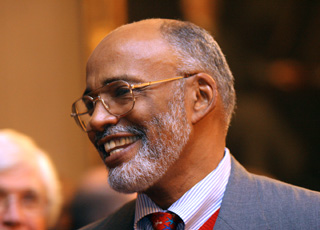Reception for UI professor offers thanks for research

Leon Dash, professor of Journalism, Pulitzer Prize-winning author and former Washinton Post reporter, talks with guests at a reception celebrating the acquisition of his papers in the Marshall gallery of the library on Thursday evening. Dash pioneered “i Josh Birnbaum
October 28, 2005
It’s hard to acquire 20th century material that has survived years of residing in slums or gone through trips with the Angolan guerrillas. But, the University library now has more than 30 years of material from journalism Professor Leon D. Dash.
Dash, Swanlund Chair professor in Journalism and Afro-American Studies, donated his collection of papers and materials from his past works to the University for research. The collection consists of photographs, publications, correspondence, reports, interview transcriptions, sound recordings and materials from his career as a reporter for The Washington Post and as a Peace Corps volunteer.
A reception was held Thursday at 6:15 p.m. in the Library’s Marshall Gallery to celebrate the donation of Dash’s papers for research.
At the reception, comments were made by University Librarian Paula Kaufman, Dean of the College of Communications Ronald Yates, and Provost Jesse Delia to thank Dash for his donations.
“The kind of immersion journalism Leon has pioneered … It is deeply textured and layered … and produces a connection with powerful social issues that can contribute to perspectives of social justice,” Delia said. “It is also a collection that will be important to a wide range of fields … It will engage students and faculty alike.”
Get The Daily Illini in your inbox!
Attendees of the reception looked at the three cases of Dash’s work on display and had an opportunity to meet those involved in the process of organization.
“I think it’s a great opportunity for future journalists to look at and try to get a feel of what journalists do,” said Carolyn Owens, sophomore in Communications. “You can tell that Dash is really admired by his colleagues. You can tell that his work is that good.”
Thomas Weissinger, Afro-American librarian and associate professor, asked Dash in the summer of 2001 to donate his papers to the University. In January 2002, Teresa Hamilton, a University alumna, was trained to organize the papers. For two and a half years, Hamilton organized 32 years of material, and the papers were physically turned over to the archives in November of last year.
“I’m happy about the whole process that Tom initiated because at many different points over the two and a half years (Hamilton) had asked me detailed questions about the material,” Dash said. “And of course if I were dead, those questions could not have been answered.”
Dash’s papers are accessible to all students and faculty. A selected few are on display until Monday at the University library. The remaining material is located in the University Archives, Room 19 of the main Library.
Among Dash’s papers were the raw materials from his Pulitzer winning newspaper series, “Rosa Lee: Poverty and Survival in Washington.”
“What I think is significant (about the papers) is seeing Leon at work in that interview in a way in which he treated them very sensitively and humanely at the time but yet succeeded in drawing out from them what’s got to be the most private, painful memories that both of them had,” said Christopher Prom, assistant University archivist. “It’s a really extraordinary document.”
The University Archives holds three general categories of collections: the official records of the University, faculty papers and records of other organizations that support teaching and research.
“I think the different aspect Dash’s papers bring is that they really offer a truly behind-the-scenes look at journalistic methodology,” Prom said. “Dash inserted himself in the communities and … (created) a methodology that’s really not documented anywhere else in the country the same way it is documented in this collection.”
Dash is credited for creating the methodology of “immersion journalism,” a technique requiring journalists to spend large amounts of time on their subjects to gain a more accurate and intimate perspective.
“I hope (students) will learn some of the social lessons that Professor Dash has documented,” Kaufman said. “All these issues of children bearing children and the state of urban poverty and urban life for people who are struggling to make it financially are things that we don’t see in Champaign-Urbana. We would see them if we look for them, but we don’t look. I hope that Professor Dash’s papers will open a window for people to start looking not only at Washington, D.C., but closer to home at some of the problems that our society deals with or often ignores.”
Following the ceremony, Nicholas Lemann, dean of the Graduate School of Journalism at Columbia University, spoke at a Center for Advanced Study/MillerComm lecture, addressing the topic of “Journalism and Social Justice.”
“I thought it was interesting,” said Candice Hurst, junior in Communications. “I liked how he addressed racial issues in journalism and how progressive journalists came in and stereotyped themselves. As a journalist, it’s hard to define between social issues and journalism.”






